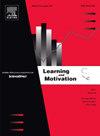游戏强化学习环境中学业动机、自我效能感、成就情绪与词汇学习的关系研究
IF 1.7
4区 心理学
Q3 PSYCHOLOGY, BIOLOGICAL
引用次数: 0
摘要
尽管人们对游戏化的兴趣日益浓厚,但关于游戏化对学业动机、自我效能感、成就情绪(ae)和词汇学习等关键因素影响的实证证据仍然很少。本研究利用活动理论作为概念框架,研究了与传统教学方法相比,游戏强化学习(GEL)环境如何影响这些变量,从而解决了这一差距。共有361名男女学生参加了一项准实验设计。研究对象采用分层随机抽样的方法进行选择,以确保不同学术水平和背景的样本具有代表性。这项研究涉及两组:一组采用传统的教学方法,另一组采用游戏化的学习环境。通过对学业动机、自我效能感、ae和词汇习得的有效前测和后测收集定量数据。结果显示,与传统环境下的学生相比,GEL环境下的学生表现出更高的学习动机和自我效能感。此外,游戏化学习参与者在词汇和ae的后测中表现优于传统参与者。该研究对教师和课程开发人员的启示意义重大,表明将游戏元素融入语言教学可以增强动机、自我效能和整体学习成功。本文章由计算机程序翻译,如有差异,请以英文原文为准。
Mapping academic motivation, self-efficacy, achievement emotions, and vocabulary learning in a game-enhanced learning environment from the lens of activity theory
Despite the burgeoning interest in gamification, empirical evidence on its impact on critical factors such as academic motivation, self-efficacy, achievement emotions (AEs), and vocabulary learning remains sparse. This study addressed this gap by examining how a game-enhanced learning (GEL) environment influenced these variables compared to traditional instructional methods, utilizing Activity Theory as the conceptual framework. A total of 361 students, encompassing both genders, participated in a quasi-experimental design. The participants were selected using stratified random sampling to ensure a representative sample across different academic levels and backgrounds. The study involved two groups: one engaged with traditional instructional methods and the other with a gamified learning setting. Quantitative data were collected through validated pretests and posttests measuring academic motivation, self-efficacy, AEs, and vocabulary acquisition. The results revealed that students in the GEL environment exhibited significantly higher levels of academic motivation and self-efficacy compared to their peers in the traditional setting. Furthermore, the gamified learning participants outperformed their traditional counterparts on the posttests of vocabulary and AEs. The study’s implications for teachers and curriculum developers are significant, suggesting that integrating game elements into language instruction can bolster motivation, self-efficacy, and overall learning success.
求助全文
通过发布文献求助,成功后即可免费获取论文全文。
去求助
来源期刊

Learning and Motivation
Multiple-
CiteScore
2.90
自引率
0.00%
发文量
53
期刊介绍:
Learning and Motivation features original experimental research devoted to the analysis of basic phenomena and mechanisms of learning, memory, and motivation. These studies, involving either animal or human subjects, examine behavioral, biological, and evolutionary influences on the learning and motivation processes, and often report on an integrated series of experiments that advance knowledge in this field. Theoretical papers and shorter reports are also considered.
 求助内容:
求助内容: 应助结果提醒方式:
应助结果提醒方式:


